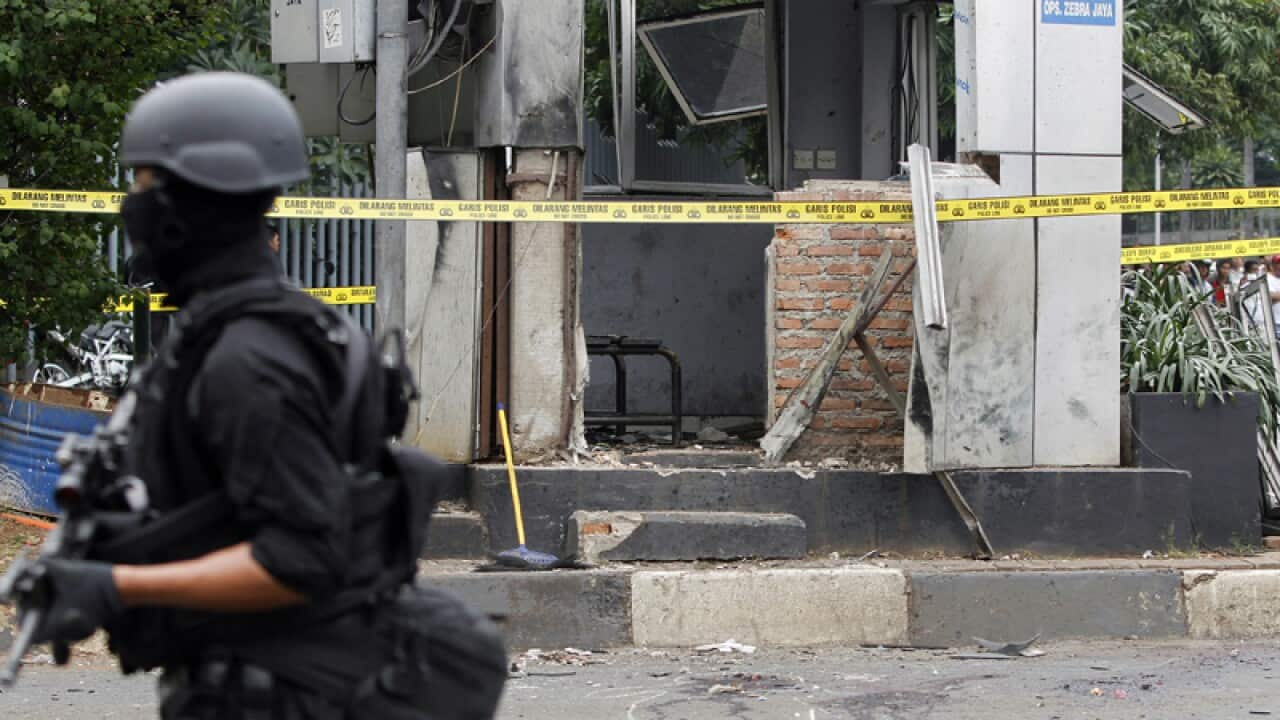Indonesian police suspect links to Islamic State (IS, or ISIS) in the attacks on the capital Jakarta that have claimed at least seven lives, including those responsible.
The attack began with a suicide bomber detonating outside the Starbucks coffee shop on Jl Thamrin, one of the capital's main roads, around 11am on Thursday.
A second team of men then attacked the police post in the traffic island of the busy intersection, Co-ordinating Minister for Security Luhut Panjaitan said.
In total, five attackers and two innocent victims - an Indonesian and a Canadian - were killed, he said.
A further 15 people and five police officers were injured.
National Police spokesman Anton Charliyan told Indonesia's Metro TV "it's obviously ISIS," referring to a threat the group allegedly made to Indonesia after the Paris terror attacks.
National Police Deputy Chief General Budi Gunawan told Kompas TV the attackers were linked to a network that was raided before Christmas.
Intelligence from Australia and the US led Indonesian authorities to an IS-inspired or -linked network that was planning to hit police targets and New Year celebrations in Jakarta.
"We know that two or three perpetrators hadn't been caught," he said.
"So this is it."
Indonesian National Counter-terrorism Agency chief Saud Usman Nasution saw similarities with the Paris attacks, but wanted further investigation before making any conclusions about IS involvement.
"The attack on the police post used explosives and there was also shooting," he said.
"What we saw happen in Paris was like this too. We can't conclude just yet."
The attacks took place near the Jakarta office of the UN, where Sandra Siagian counted seven explosions altogether.
"When we heard the explosions go off everyone was panicking and we didn't know what to do," she told AAP from Jakarta.
A series of photos by Indonesian news portal Tempo showed that after the blast at the police post, with three victims still laying on the ground, two gunmen appear behind the crowd gathered at the intersection.
Both wearing caps and T-shirts, the men are photographed shooting at police.
Disturbing amateur video provided to TV stations meanwhile appeared to show the suicide bombing outside Starbucks.
Jakarta Police Chief Tito Karnavian said the situation on the street was contained within 25 minutes.
The Skyline Building that Starbucks is located within was searched and a clearing device found six more bombs in the area - five fist-sized handmade grenades and one larger one, "the size of a biscuit can".
"The perpetrators' network is actually ... related with ISIS in Raqqa," he told reporters.
"You may know that ISIS has changed strategy ... there's orders from its emir, Abu Bakr al-Baghdadi, to have operations outside Syria and Iraq."
Australia's Attorney-General George Brandis offered Jakarta law enforcement and intelligence assistance if needed, and Foreign Minister Julie Bishop contacted her counterpart Retno Marsudi to extend support.
Part of the Jl Thamrin intersection reopened to traffic and many curious onlookers at 4.30pm local time, after police declared the situation safe.
President Joko Widodo asked that citizens be calm and unafraid.
"The state, the nation and the people, they, we, can't be afraid, can't be defeated by this act of terror," he told reporters.
The president cut short a visit to West Java to visit the attack site late on Thursday afternoon.
The hashtag "Kami Tidak Takut" - "We are not afraid" - was trending on Twitter as Indonesians expressed their solidarity.
Jakarta was last hit by a terror attack in 2009, when suicide bombers co-ordinated to strike the JW Marriott and Ritz Carlton Hotels, killing seven people, including three Australians and one New Zealander.
The Department of Foreign Affairs and Trade (DFAT) advised Australians to exercise "a high degree of caution" in Indonesia, which was no change in the overall threat level before the attacks.
Share

